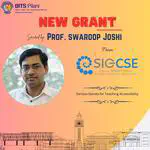Sugamyata
Table of Contents
Sugamyata (सुगम्यता) means Accessibility in most Indian languages.
We are working on building a serious game to teach accessibility. Scroll down to read the details.
If you want to contribute to this project, read this post and contact us.
Background
The World Health Organization estimates that more than a billion people live with some form of disability. The United Nations Convention on the Rights of Persons with Disabilities (CRPD) mandates countries to “… promote the design, development, production, and distribution of accessible information and communications technologies and systems…”. To accomplish this, concepts and skills needed to develop accessible products and services must be included in computing education. Software companies like Google, Facebook, Apple, and Microsoft emphasize making their products accessible, and accessibility often features as a preferred skill in their job postings. For instance, a current Google job posting for a Software Engineer position specifies “Experience developing accessible technologies” as a preferred qualification.
The Problem
Despite such increasing awareness in the software industry about accessibility in the recent years, many mainstream software products fall short of meeting accessibility criteria. Software professionals point to a lack of relevant knowledge and skills in comupting education for this gap in implementing accessibility.
According to the computing (CS) faculty, the main barriers to teaching accessibility include the lack of clear learning objectives about accessibility and their lack of knowledge about accessibility. Also, most instructors who teach accessibility have a background in human-computer interaction (HCI) and related fields and teach these topics in specialized courses. This indicates that other instructors may find it challenging to build their expertise and to incorporate accessibility topics in “mainstream” CS courses.
Our Contribution
We aim to bridge this gap by developing relevant course material, resources, and assignments that other instructors can easily integrate in their course without much prior knowledge about accesibility and without diluting the “core” learning objectives.
Our CSF314: Software Development for Portable Devices at BITS Pilani, Goa, incorporates introduces accessibility principles early on in the semester and assesses students on their accessibility knowledge through multiple assignments. Our findings indicate that students gained in accessibility awareness, technical knowledge, and empathy after taking this course. All lectures notes, assignments, and resources are publicly available.
Serious games for teaching digital accessibility to computing students and software professionals
Partha, my PhD advisee, is working towards his thesis with this title. He, along with some undergrads, is developing a Unity-based game for teaching accessibility principles and web accessibility guidelines and assessing the impact on CS students and software professionals.
